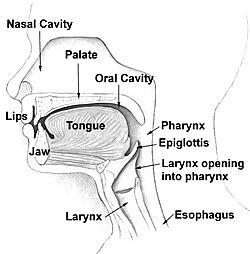Palate facts for kids
Quick facts for kids Palate |
|
|---|---|
 |
|
| Head and neck. | |
 |
|
| Palate exhibiting torus palatinus. | |
| Latin | Palatum |
The palate is the roof of your mouth. It's a very important part of your body! It acts like a wall, separating your mouth from your nose. This means you can chew and breathe at the same time.
Animals like crocodilia (crocodiles and alligators) also have a palate. However, in most other tetrapods (animals with four limbs), the mouth and nose areas are not completely separate.
What is the Palate?
The palate is the structure that forms the top of your mouth. It helps you speak, eat, and breathe. It's made of two main parts. One part is hard and bony, and the other is soft and flexible.
Hard Palate
The front part of your palate is called the hard palate. You can feel it with your tongue. It's made of bone and is covered by a special tissue. This hard part gives your tongue a surface to press against when you swallow food. It also helps you make certain sounds when you speak.
The hard palate forms before you are born. Sometimes, it doesn't close completely. This is called a cleft palate. It is a birth defect, meaning it happens while a baby is developing. Doctors can often fix a cleft palate with surgery.
Soft Palate
The back part of your palate is called the soft palate or velum. It's made of muscle and soft tissue. You can't feel it as easily with your tongue because it's further back. The soft palate is very flexible.
When you swallow, the soft palate moves up. This closes off the passage to your nose. This stops food and liquids from going into your nose. It also helps with speech, especially for sounds like "k" and "g."
Palate and Taste
Long ago, people thought the palate was where you tasted things. Because of this, the word "palate" can also mean your sense of taste. For example, if someone has a "discriminating palate," it means they are good at noticing different flavors. They might be able to tell the difference between many types of food or drink.
You might also hear someone talk about the "palate" of a food or drink. This refers to its overall flavor. For instance, a wine might have a "fruity palate." This means it tastes like fruit.
See also
 In Spanish: Paladar para niños
In Spanish: Paladar para niños
 | Kyle Baker |
 | Joseph Yoakum |
 | Laura Wheeler Waring |
 | Henry Ossawa Tanner |

